David Bowie's Nashville (and American) debut, 50 years later, celebrated in new book
- Oops!Something went wrong.Please try again later.
- Oops!Something went wrong.Please try again later.
UK's Genesis Publications has released a 20th-anniversary edition of "Moonage Daydream: The Life & Times of Ziggy Stardust," a book that, when released, was the 30th anniversary of David Bowie and photographer Mick Rock touring the globe for two years to promote the former's landmark, superstar-making album "Ziggy Stardust and the Spiders from Mars." Featuring over 600 photographs taken by his personal photographer Mick Rock and 15,000 words of Bowie's commentary, the book offers insight into Bowie himself and the "Ziggy Stardust" persona.
On November 20, 1972, at Nashville's Municipal Auditorium, David Bowie played the 17th gig on the first North American leg of the eventually two-year, 191-date "Ziggy Stardust" worldwide tour.
Bowie "[attempted] to go beyond the realm of 'peculiar' rock and roll into the realm of science fiction" with a puzzling" and often "unsatisfying" performance, offered The Tennessean's Jerry Bailey on November 21, 1972, about Bowie's concert in front of over 4,200 people.
Talking all things Bowie and "Moonage Daydream" is where The Tennessean -- in 2022 -- finds Genesis Publications' managing director, Nick Roylance.
"As an album and persona, Ziggy Stardust is a cornerstone of modern culture and music," says Roylance. Though mixed reactions daunted Bowie, publisher Roylance adds that "traveling in America and discovering his passion for a place where he would eventually live were some of [Bowie's] favorite times in his life."
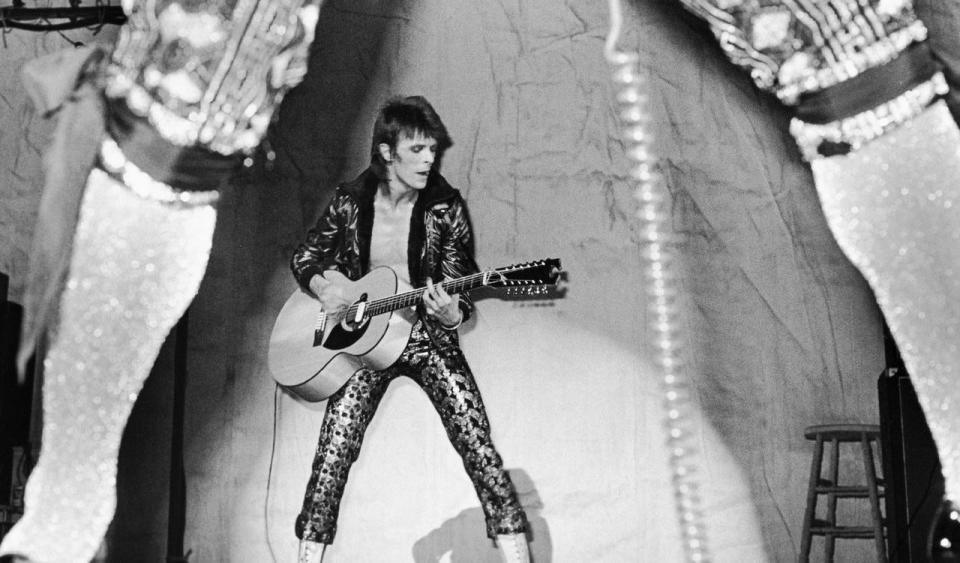
Related to Nashville and country music, Roylance characterizes a "melting pot of 1950s rockabilly and Gene Vincent" influences in the Ziggy persona that ultimately guided what inspired -- from the punk to new wave and more -- as an "intercontinental, underground-to-mainstream interchange" that eventually eased the birthing of successful careers for the likes of Lady Gaga, Lil Nas X and Madonna.
Bowie's Music City concert date was just ten days after Republican Richard Nixon won a second term as America's president. Nixon's politically and socially conservative "silent majority" voting bloc of heartland and Southern-residing middle-class white voters reigned supreme over what political journalist Theodore H. White characterized as the nation's more liberal "leading cultural media and influence makers."
"Ziggy Stardust challenged how people saw gender, sex and society while, as Bowie notes, 'rock music -- as a leading cultural factor -- wandering into a den in hell,'" says Roylance.

Representing himself as an "alien, androgynous and provocative rock star figure with brightly colored hair, makeup and space-age clothing" did Bowie no favors in conservative Southern areas that supported Nixon's re-election.
However, Roylance highlights that performances offering "love in the form of classic rock and roll" and Bowie "pushing the boundaries of what it meant to express himself freely" sometimes superseded that antagonism.
That didn't stop Bowie's entourage for his American dates from including bodyguards Tony Frost and Stevie George. In public, they often wore black-belted judo robes over their slacks.
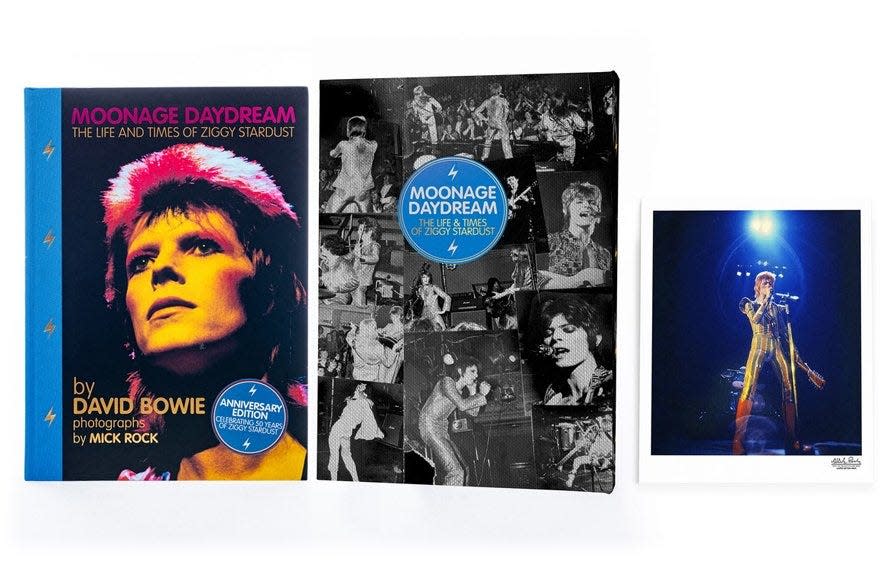
"America had a reputation for violence," quoted photographer Rock regarding foreign notions about the United States in the 1960s and early 70s.
However, for dates in some cities, the glam rock era's excitement had already arrived. A not-so-silent majority was ravenously prepared to be entertained. Thus, the need for the menacing pair was minimal.
In New York City, the New York Dolls, avant-garde creator Andy Warhol and his "superstar" crowd of actors, artists, gender-bending drag kings and queens, filmmakers, poets and writers all came to see Bowie's September 28 performance at Carnegie Hall. The event was described as an "ape s**t" crowd offering a five-minute standing ovation for a show complete with "explicit sexual movements" and "adrenaline-flowing" rock, as noted via reviews from writers including novelist Eric Van Lustbader.
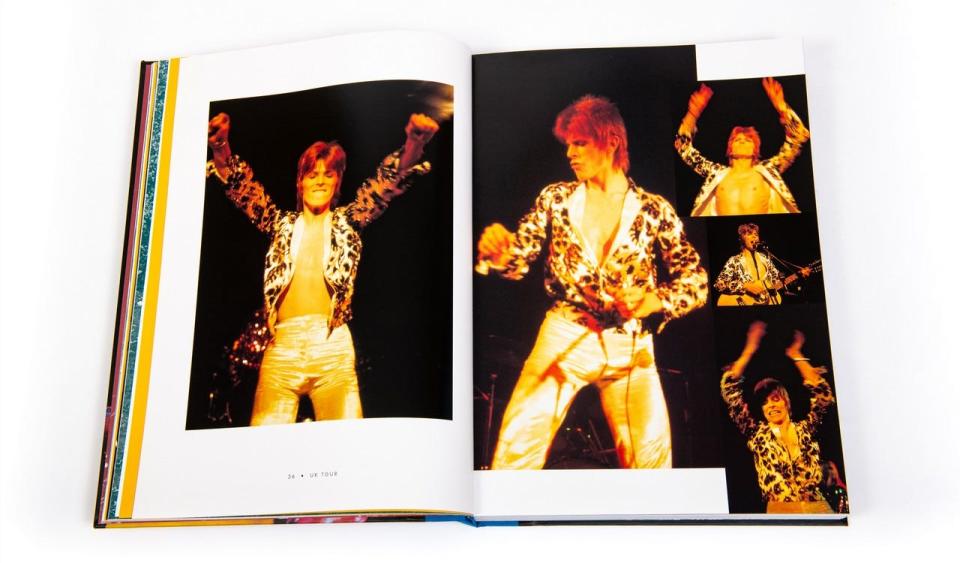
Like Bowie notes about St. Louis and other Midwest cities where he notes that there were "just a few hundred people" in the venue, Nashville was -- unlike New York City -- a place where their "fancy new wave" was mocked and "not a Ziggy town" where Bowie and his band, the Spiders From Mars, were more lightly regarded.
Foremost, in response to his American public relations hire -- another Warhol superstar, singer-songwriter Cherry Vanilla -- hyping Bowie as "the new Elvis Presley," a brief flurry of protests occurred at the Municipal Auditorium.
Moreover, what the UK's Guardian referred to as fusing "1950s nostalgia and the superstar image" -- the core components of Bowie's creative evolution into the "Ziggy Stardust" persona -- caused a more light-hearted but notable event to transpire.
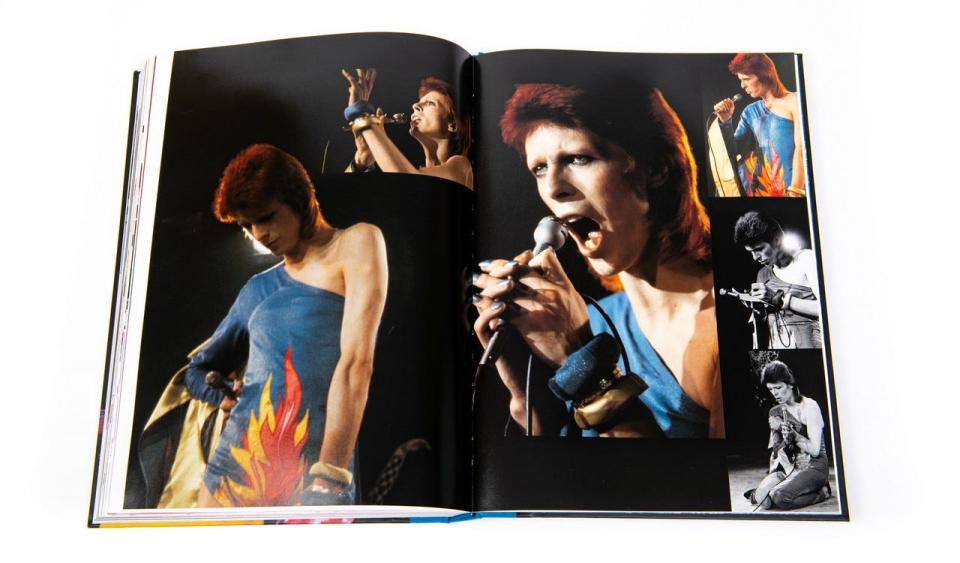
A user of BowieNet (the "Space Oddity" vocalist's online fan community from 1998-2006) notes via Bowie's website that globalized notions of what "1950s nostalgia" could conjure met with then modern takes on the concept when he arrived in Music City and stayed at a hotel near the studios of WLAC-TV -- the home of taping Hee Haw until 1980.
"...in the lobby of the hotel (near where they shot Hee Haw), there was a staircase in the middle of the lobby. At about the same time, Roy Clark (cowboy star of Hee Haw) came around the corner and started up the stairs in a full country outfit. Bowie is coming down the same stairs all 'Bowied.' At the midpoint, they meet. Bowie just glances and nods and Roy Clark stops and I swear his mouth fell to the floor and his eyes bugged out. We laughed so hard."
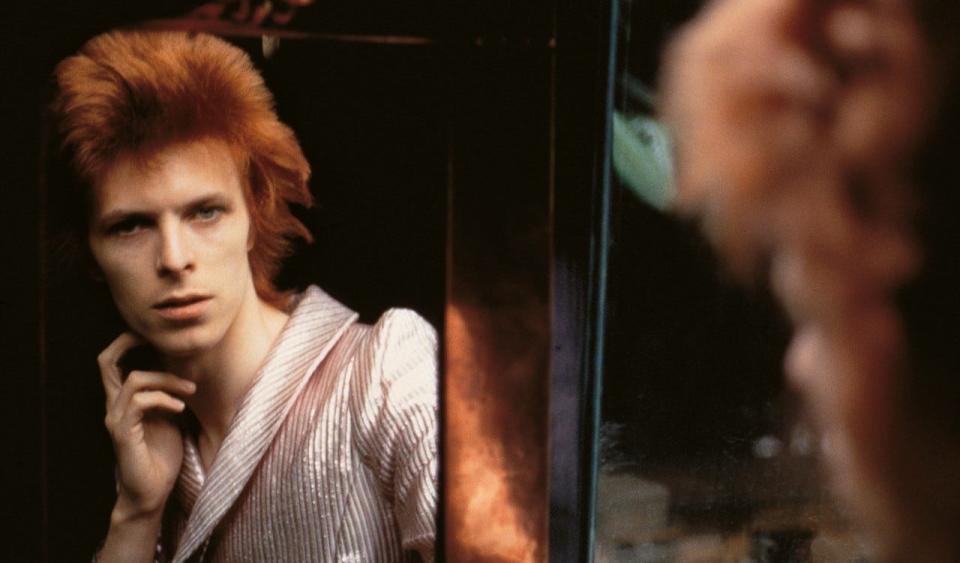
Though there is no photography from the Nashville date in the 346-page hardcover book, the notes -- like Bowie learning to love America while traveling the Midwest by train -- are engaging. Concerning this point, in particular, the idea that the "Moonage Daydream" vocalist learned to love a country while traveling by train across land masses where had he walked the streets, he'd possibly be ostracized into intensely disliking the country provides moments for bittersweet reflection.
Overall, "Moonage Daydream" serves as a "fascinating, must-see document" of the art, culture and imagery Bowie created in the creative development of his Ziggy Stardust persona that predated how pop music has been packaged and presented into the current era and beyond, Roylance adds.
From "peculiar" to "pop," Bowie's legacy endures.
For more information on the anniversary edition of "Moonage Daydream," visit www.BowieBook.com.
This article originally appeared on Nashville Tennessean: David Bowie's Nashville (and American) debut celebrated in new book

